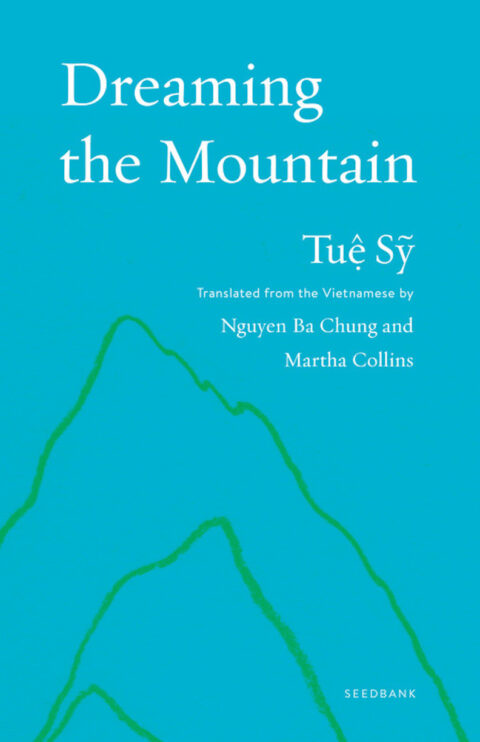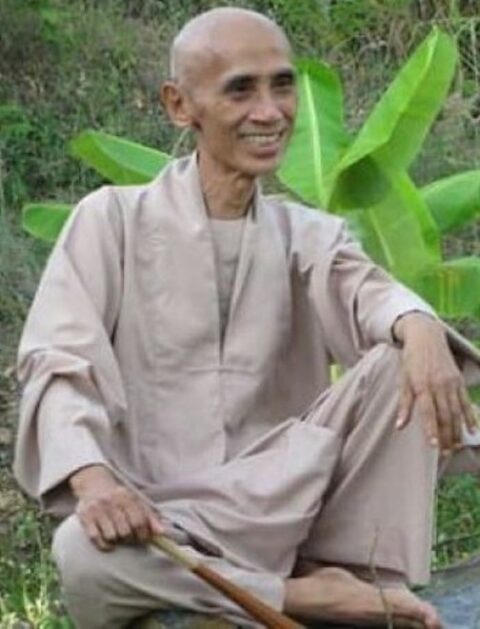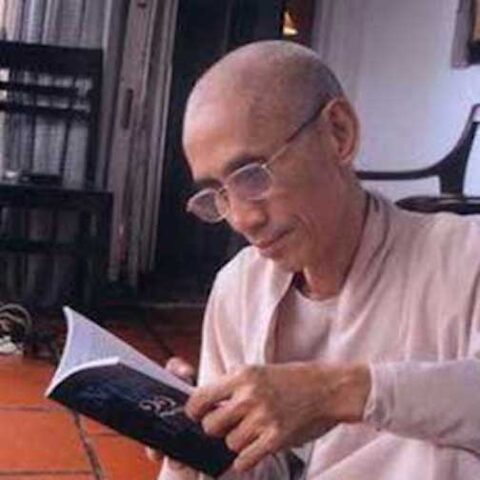Tuệ Sỹ, the author of Dreaming the Mountain, one of Vietnam’s most celebrated poets. His co-translators, Nguyen Ba Ching and Martha Collins, present his work in chronological order. The first three sections — pre-1975, 1975-77, and 1978-1984 — cover his first years as a monk and scholar; the period after he fled Saigon for the Buddhist Institute in Nha Trang, then, when it was overrun, lived as a hermit in a remote forest; and the two years he spent in re-education prison. The final two sections — 2000-2001 and 2006 — were written in Ho Chi Minh City where he has lived since his release after being sentenced to 20 years of hard labor.
 The most important thing to remember when reading this book is that Tuệ Sỹ was a Buddhist Monk. Forget it, or dismiss it as incidental, and the deep beauty of his apparently scattered-but-not, nature-poetry-but-not, love-poetry-but-not style is likely to elude you. Because the sections are organized chronologically, you can infer but not be entirely certain about whathis life was like when he composed them. This is for two reasons: first, he rarely describes any situation directly, and second, what he does say isn’t necessarily literal. Co-translator Martha Collins suggests this second point when she notes that the poet himself said that by “glimpse(s) your slim shoulder / your thin dress,” he meant not the love of a woman but the idea of safety.
The most important thing to remember when reading this book is that Tuệ Sỹ was a Buddhist Monk. Forget it, or dismiss it as incidental, and the deep beauty of his apparently scattered-but-not, nature-poetry-but-not, love-poetry-but-not style is likely to elude you. Because the sections are organized chronologically, you can infer but not be entirely certain about whathis life was like when he composed them. This is for two reasons: first, he rarely describes any situation directly, and second, what he does say isn’t necessarily literal. Co-translator Martha Collins suggests this second point when she notes that the poet himself said that by “glimpse(s) your slim shoulder / your thin dress,” he meant not the love of a woman but the idea of safety.
Many lines in Dreaming — for example –“I still wait through black, windless nights / the pure shimmering black of ancients’ eyes” — embody the Zen view that everything we experience is simultaneously present and evanescent. Thus, transition-less moves in poetic time and space that might be regarded as dissonant in another culture are natural in this one. They’re aspects of a whole whose nature may be defined only in a way that seldom lends itself to simplistic explanation. In other words, for Tuệ Sỹ every river is both its surface and its depth, its present and its past, and every life is a blink of lightning or, maybe more precisely, a dream. This perspective, it seems to me, is what kept him alive and sane in the years he was imprisoned.
I also feel that the poetic leaps in his work serve a principle that’s been in my mind for years: that the best way to describe anything, physical, emotional, or spiritual is to shine light on it from more than one direction. Which is what Tuệ Sỹ does luminously. But if you point a flashlight around a room that’s dark as a cave, the sum of those glimpses will never add up to a view of the whole room, because there are always the interstices.
Here is the opening poem, “A Piece of Old Sky.” Its apparent contradictions and temporal leaps, make it clear that by the time he was old enough to put pen to paper, Tuệ Sỹ’s mind was steeped in the thought that would guide him for the rest of his life.
Damp young eyes, sky over old gatherings
A deserted hill, a blue dress no longer blue
Rushing, I see myself as a vagabond
Telling stories by lamplight, a fading moon
From cold mountain to sea, forever silent
this stony crest, those salt grains haven’t dissolved
Smile in the sunlight: how quickly a day passes
Today winter, tomorrow summer — how sad
I count my silver hairs, but I’m not old
Tired feet walk back and forth on the dusty road
Looking back, I see four sullen walls
A distant stream runs up and down through the forest
This poem is more subtle than its pared-down wording may suggest. Consider the way the first three words present themselves in the now, then shift immediately to the past, leaving us to imagine what the transition between them may be. So why are Tuệ Sỹ’s eyes damp? For me, the answer lies in the juxtaposition of these first two images. In other words, I see him moved to the point of tears because he has just realized, probably for the first time (he is young), that the sky he sees is the same sky that presided over events that happened millennia before his birth. And that is only the first line.
 In the second, if you don’t happen to know that blue in Buddhist thought denotes “peace,” you’ll miss the fact that “no longer blue” almost certainly refers to the fact that this poem was written in the middle of a war. It seems to me that the compassion in the poem that follows this one confirms this theory. Called “Bird Wing Sky,” it begins, “A promise has been buried in mourning / A bird disappears in the distant sky.”
In the second, if you don’t happen to know that blue in Buddhist thought denotes “peace,” you’ll miss the fact that “no longer blue” almost certainly refers to the fact that this poem was written in the middle of a war. It seems to me that the compassion in the poem that follows this one confirms this theory. Called “Bird Wing Sky,” it begins, “A promise has been buried in mourning / A bird disappears in the distant sky.”
In the next line and a half of this first poem, something new happens, this time not to do with the poem itself but with the way those lines foreshadow the years that Tuệ Sỹ, who couldn’t have known this when he wrote them, will spend in a hut doing exactly what he describes here: “telling stories by lamplight.”
Now the scene changes to a fading moon (echoing the dress) overlooking the mountains and the sea. I find the way Tuệ Sỹ links the two while presenting them as separate as particularly thrilling because it reminds me of a morning when, camped on a mountaintop in Wyoming, I suddenly realized that I was surrounded by sea creatures.
From this point until the last line, the leaps are emotional: first frame, smile, second frame, lamentation at how quickly life passes. The choice of “sullen” to modify “walls” is Tuệ Sỹ’s most interesting move to me because it implies, without pounding the peg all the way into the hole, a certain temperament. If he were a western poet, one might assume he’s invoking adolescence but because he isn’t, we shouldn’t. That said, the fact that the walls lie behind Tuệ Sỹ may mean something. Or not. Meanwhile, somewhere in a far-off forest, a stream runs. This leap makes a brilliant end to this poem and aptly begins the flow of his life from the age of ten when his parents took him to be raised in a monastery until and during his academic career in Saigon..
It’s in section rwo, the time he spent in retreat that he, foretold teller of tales, adopts a stormy, remote peak in the Troung Son mountains as the incarnation of his troubled country. Here is that poem in its entirety:
I can still hear the cicadas’ songs
Can still love the night fire’s flames
Home is just a peak in the Troung Son
Let us proclaim our thousand year indignation
Though, Tuệ Sỹ has often written about inner-directed emotions such as sorrow, this is the first time in this book that he has expresses an outer-directed one. But neither here nor anywhere else does he suggest that indignation should trigger physical aggression. In fact, later he will say the opposite, that “Love, when true, takes no revenge on others.”
And speaking of love, this section contains an especially poignant poem, shown below — “My Father’s Shadow” — in which the only apparent departures from the subject of wandering son/dying father aren’t departures at all, because in Vietnam, riding a crane is a metaphor for death and because incense is regularly paired with Buddhist prayer to invoke both the ancestors and our own impermanence.
Fifteen years on the road, oh Father
Such heartbreaking pain while I wandered
I pictured you sitting through long nights
White hair on a high pillow; my body churned
In this fleeting life I’ve not flourished
Dreaming a crane’s wing, fearing heaven’s designs
Under the moon, the shifting tides
the horizon beguiles: the wanderer’s eye dims
Deep in fading dreams, fearing your death
Alone in an inn, stung by my prayer’s smoke
The following section of poems was written in the re-education camp to which Tuệ Sỹ was sent shortly after he left the mountains. This section contains some of the most gorgeous language in the book. For example “For a long time I’ve been sitting in a graveyard / Like white silk, cold moonlight covers the forest” and “I bathe in the moon’s stream, by a strange hill / On an autumn evening, an island shines bright green.”
 The two final sections, written when he was free, prove that for all he suffered, he never lost the clarity he shares with mountain streams. This, from the series called Meditation Room: “I travel in the Everlasting World / Remember the canopied trees, their falling flowers” and this from Refrains for Piano: “Friend, you keep going / Moss thins on the threshold / Fading sunlight / Wild grass by the river.”
The two final sections, written when he was free, prove that for all he suffered, he never lost the clarity he shares with mountain streams. This, from the series called Meditation Room: “I travel in the Everlasting World / Remember the canopied trees, their falling flowers” and this from Refrains for Piano: “Friend, you keep going / Moss thins on the threshold / Fading sunlight / Wild grass by the river.”
That we have access to these poems at all is thanks to the fine work of Nguyen Ba Chung for making sure the English represents the Vietnamese as accurately as possible, and to Martha Collins for her courage in translating from a language as complex as Vietnamese — a language with six tones, no tenses, and no clear pronouns. These characteristics represent only the beginning of an anglophone translator’s challenges.
For me, Ms. Collins’ account of Thích Phuoc An’s description of his visits to Tuệ Sỹ when he was living in deep forest provides the perfect metaphor for this book. “The road was zigzagging and tortuous, so it was a hard slog. There was nothing there … besides the flickering oil lamp in the straw hut and the massive darkness in the middle of an immense forest.” Only Tuệ Sỹ, a small man tending a fragile light, fragile. Yet how it shone.
[Published by Milkweed Editions on June 13, 2023, 129 pages, $18.00 paperback]